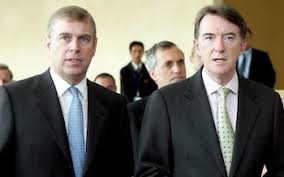Mandleson and Jeffrey Epstein: Petie Goes to Manhatten
If Peter Mandelson’s name didn’t already ring alarm bells for Labour loyalists, his recurring role in scandals involving billionaires and power players should do the trick.
Ed Grimshaw
12/21/20244 min read


If Peter Mandelson’s name didn’t already ring alarm bells for Labour loyalists, his recurring role in scandals involving billionaires and power players should do the trick. Now, with newly unearthed links to Jeffrey Epstein, the Labour peer has once again found himself at the epicentre of controversy, raising fresh concerns not only about his judgment but also about Labour’s. His appointment as Britain’s ambassador to the United States would be controversial enough on its own, but with this backdrop? It’s starting to look like the party has learned absolutely nothing from its previous forays into cronyism and poor oversight.
Epstein, Emails, and a Dubious Friendship
The details are lurid and persistent. A JPMorgan report, filed in a New York court, chronicles emails, meetings, and weekend stays that place Mandelson in Epstein’s orbit during his years as UK business secretary and beyond. Epstein’s pet name for him, “Petie,” might sound charming in another context, but here it reeks of familiarity in all the wrong ways.
Mandelson’s connections to Epstein date back at least to the early 2000s, when he was introduced by Ghislaine Maxwell. While there’s no evidence to suggest he was involved in or aware of Epstein’s crimes, the optics are appalling. His apparent willingness to accept Epstein’s hospitality—even during the financier’s 2009 imprisonment for soliciting a minor—speaks to a troubling pattern: Mandelson’s repeated failure to distance himself from the ethically dubious figures whose wealth and influence he courted.
Labour’s Blind Spot?
Which brings us to the elephant in the room: Mandelson’s looming appointment as ambassador to the United States, reportedly a pet project of Keir Starmer’s Labour leadership. It’s hard to imagine a more tone-deaf decision. At a time when Labour is trying to shed its reputation for mismanagement and ethical lapses, elevating Mandelson to such a high-profile post would feel like a deliberate slap in the face to voters looking for a fresh start.
For decades, Mandelson has embodied Labour’s internal contradictions—simultaneously the architect of its greatest electoral successes and the poster boy for its most egregious lapses in judgment. His resignations in the late 1990s and early 2000s over financial scandals should have been career-ending moments. Instead, like a political Lazarus, he kept returning, often to positions of even greater influence.
And now, rather than keeping a safe distance from controversy, Labour seems poised to reward Mandelson once again. His appointment would not only send the wrong message to voters but also underscore a troubling blind spot within Labour’s leadership: a willingness to forgive, overlook, or outright ignore behaviour that would sink others in their ranks.
Corruption, Mismanagement, or Just Mandelson?
Labour’s broader problem is that Mandelson’s scandals aren’t an isolated case—they’re part of a larger pattern of questionable decision-making that has haunted the party for years. From financial missteps during the Gordon Brown years to the leadership chaos under Jeremy Corbyn, Labour has often struggled to project competence. Mandelson’s track record—of courting controversy, hobnobbing with oligarchs, and navigating murky waters of influence—fits too neatly into this narrative of mismanagement.
By signalling its trust in Mandelson with ambassadorship, Labour risks reinforcing perceptions of a party that cannot break free from its past. His ties to Epstein, even if tangential, are the kind of toxic baggage no serious political movement should want to carry into the next election.
The Ambassador Question
Would Mandelson make a capable ambassador to the United States? On paper, his resume is formidable: co-architect of “New Labour,” a seasoned negotiator, and an international consultant with a network of global contacts. But diplomacy is about more than competence—it’s about credibility. And that’s where Mandelson falls short.
The United States isn’t just any diplomatic post; it’s the crown jewel of foreign postings. An ambassador needs to embody the best of Britain, not bring along a carousel of headlines about yachts, oligarchs, and “Petie” weekends in Manhattan. How can Labour expect to rebuild trust with British voters if it’s willing to send someone with Mandelson’s history to represent the country on the world stage?
A Warning Sign for Starmer
Keir Starmer has attempted to rebrand Labour as a party of integrity and competence, shedding the baggage of the Corbyn years and presenting himself as a credible alternative to the Conservatives. But Mandelson’s appointment, if it happens, risks undoing much of that work. It signals a worrying willingness to revert to the old ways of cronyism and insider politics that alienated so many voters in the first place.
This isn’t just about Mandelson. It’s about what his presence in a senior role says about Labour’s priorities. Is the party committed to a fresh start, or is it content to recycle the same figures whose names evoke scandal and mismanagement?
The Bigger Picture
Mandelson’s saga is a cautionary tale about the perils of power and the compromises it demands. His association with Epstein, while not necessarily damning on its own, reflects a broader issue of judgment—both his and Labour’s. By allowing figures like Mandelson to remain at the heart of its leadership, Labour risks reinforcing the very perceptions of elitism, detachment, and ethical ambivalence it so desperately needs to overcome.
If Labour wants to prove it’s serious about change, it needs to start by looking hard at the company it keeps. And if Starmer wants to convince the public he’s the man to lead Britain, he would have done well to steer clear of appointing Peter Mandelson to anything more influential than the committee for forgotten political memoirs.
